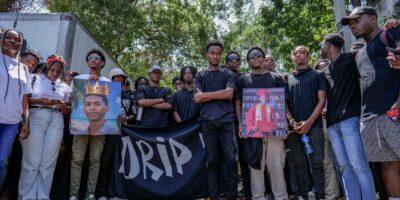Some officers injured in the fight against gangs have had to spend their savings to seek medical treatment in Cuba. They are demanding state assistance
Projectiles pierced the police officer’s arms, feet and left eye during a police operation in October 2024 in Solino.
The insurer of the Haitian National Police (PNH) officers refused to pay the treatment costs, he said.
To receive our investigations, reports, and explanatory pieces on WhatsApp, click here.
The police officer therefore had to carry out two surgical operations in Cuba alone, using his savings, without the assistance of the Office of Insurance for Work Accidents, Sickness and Maternity (OFATMA).
The « survivor » says he is running out of medication. « I don’t regret the day I joined the police, but we are treated like spare parts, » the officer told AyiboPost.
Up to twenty Haitian National Police officers injured in the fight against gangs are now in Cuba receiving treatment. In an interview with AyiboPost, half a dozen of them denounced their abandonment by the Haitian government, the lack of money, medicine, and the high cost of living in Cuba, as well as persistent uncertainty over the amount of five million gourdes supposedly available at OFATMA for police officers needing treatment abroad.
Read also:Haitian police officers chased away by gangs, forgotten by the state
Jean Bernard, a PNH inspector, died in unclear circumstances in a hospital in Cuba on Saturday, June 28, 2025.
The police officer was suffering from advanced cancer before being transferred to Cuba without proper medical consideration, according to a police officer who witnessed the incident.
The police inspector died alone in his hospital room, begging his caregivers to transfer him home to Haiti for his final days.
This situation compromises the right to health of police officers and lacks transparency, Mathieuny Sidel, spokesperson for the National Union of Haitian Police Officers (SYNAPOHA), reacts to AyiboPost.
The « survivor » says he is running out of medication. « I don’t regret the day I joined the police, but we are treated like spare parts, » the officer told AyiboPost.
The agents currently in Cuba are scattered across different hospitals and receive no psychological support in a post-traumatic context.
« Cuban doctors do not provide care without the funds allocated for the service, » explains Sidel, asking OFATMA to take responsibility.
Contacted by AyiboPost, Vikerson Garnier, the director of OFATMA, revealed the signing of a contract with a private company called « Good Money » for the support of Haitian police officers in Cuba.
This company has no known physical address in Haiti, let alone a website.
In practice, a permanent commission of experts from the Social Security Directorate of OFATMA analyses the files of injured police officers to determine whether they should receive treatment outside the country.
OFATMA then signs a contract for the police officer, on behalf of the Haitian state, with Good Money for a maximum of five million gourdes per police officer.
This entity is then responsible for transmitting the patient’s medical file to the Cuban medical authorities.
The Cuban medical service sends the file to a hospital, which returns a care plan to Good Money, which then forwards it to OFATMA.
Read also: How the insurance industry threatens access to healthcare in Haiti
“Once the care has been provided, Good Money sends the invoice to OFATMA, which then pays the amount corresponding to the costs incurred by the insured,” concludes Garnier.
Good Money, established in Haiti in 2023, receives a service fee of 3 to 4% of the total bill for each patient from the government, its operations manager, Pedro Guerrero, revealed to AyiboPost.
The official acknowledges the difficulties related to the shortage of medicines in Cuba due to the US embargo.
To compensate for this shortage, Good Money is turning to Jamaica or Panama. But the persistence of the problem raises questions about Cuba’s choice as the preferred destination for treating injured police officers.
At least 33 police officers were killed, 48.5% of them during operations against armed gangs between June 2024 and June 2025, according to the National Human Rights Defense Network (RNDDH).
Contacted by AyiboPost, the PNH spokesperson, Michel-Ange Louis Jeune, did not respond to interview requests, as did the institution’s medical director, Jean Sonny Virgile.
No state initiative has been announced to address the problems of police care in Cuba.
One of the injured agents, hospitalized in Cuba since November 2023, complains of having to pay for the medication out of his own pocket and denounces enormous difficulties in getting OFATMA to agree to cover the treatment costs.
Up to twenty Haitian National Police officers injured in the fight against gangs are now in Cuba receiving treatment. In an interview with AyiboPost, half a dozen of them denounced their abandonment by the Haitian government, the lack of money, medicine, and the high cost of living in Cuba, as well as persistent uncertainty over the amount of five million gourdes supposedly available at OFATMA for police officers needing treatment abroad.
Another injured officer, in 2024, during an operation in Gressier, denounces premature « exeats » at the end of treatment plans.
A third police officer has had to pawn property to buy food and pay for a painkiller since June.
The authorities « don’t know how we live there, » the police officer told AyiboPost from his sickbed.
A fourth police officer traveled to Cuba in October 2024 after being hit by projectiles in the right thigh. He claims to have lost all feeling due to a damaged sciatic nerve.
Even after undergoing several operations, his treatment has still not been completed. The commission reportedly did not take the injury into account in its analysis. He now finds himself in Haiti, without treatment.
The treatment plan is tailored to each individual. « But if they feel the cost will be too high, the case can be removed from the program, » the police officer laments.
« That’s why, » the officer continues, « the majority of hospitalized police officers don’t fully recover. The [Good Money] agency in charge doesn’t provide a complete treatment program; the rest is our responsibility. »
OFATMA continues to evacuate the most seriously injured police officers to Cuba.
The most recent evacuation took place on June 14, 2025: around fifteen patients, including PNH agents, were transferred due to the unavailability of suitable hospitals in Haiti.
Part of the problems encountered by these patients there stems from the socio-political context in Cuba.
Access to medicines is a major challenge in this country, which has been under a US embargo since 1960.
Most medications, such as antibiotics, painkillers, and those for chronic conditions, are imported, often in dollars, a rare foreign currency in a context of a historic decline in tourism revenue, according to a doctor currently specializing in Cuba, contacted by AyiboPost. He requested anonymity to avoid possible reprisals.
In this context, police officers must rely on their families.
Read also: Police officers desert the streets of Port-au-Prince
Without this assistance, « I would already be dead, » complains another police officer, injured in March 2024 during police operations in Delmas.
The agent says he spent a lot of money from his personal funds in Cuba and was not reimbursed by OFATMA.
By : Fenel Pélissier & Rolph Louis-Jeune
Cover: A PNH officer leans against a police car during an operation
► AyiboPost is dedicated to providing accurate information. If you notice any mistake or error, please inform us at the following address : hey@ayibopost.com
Keep in touch with AyiboPost via:
► Our channel Telegram : Click here
►Notre Channel WhatsApp : Click here
►Our Community WhatsApp : Click here







Comments